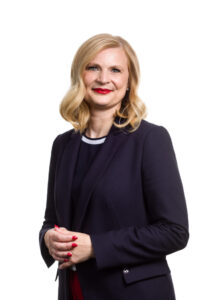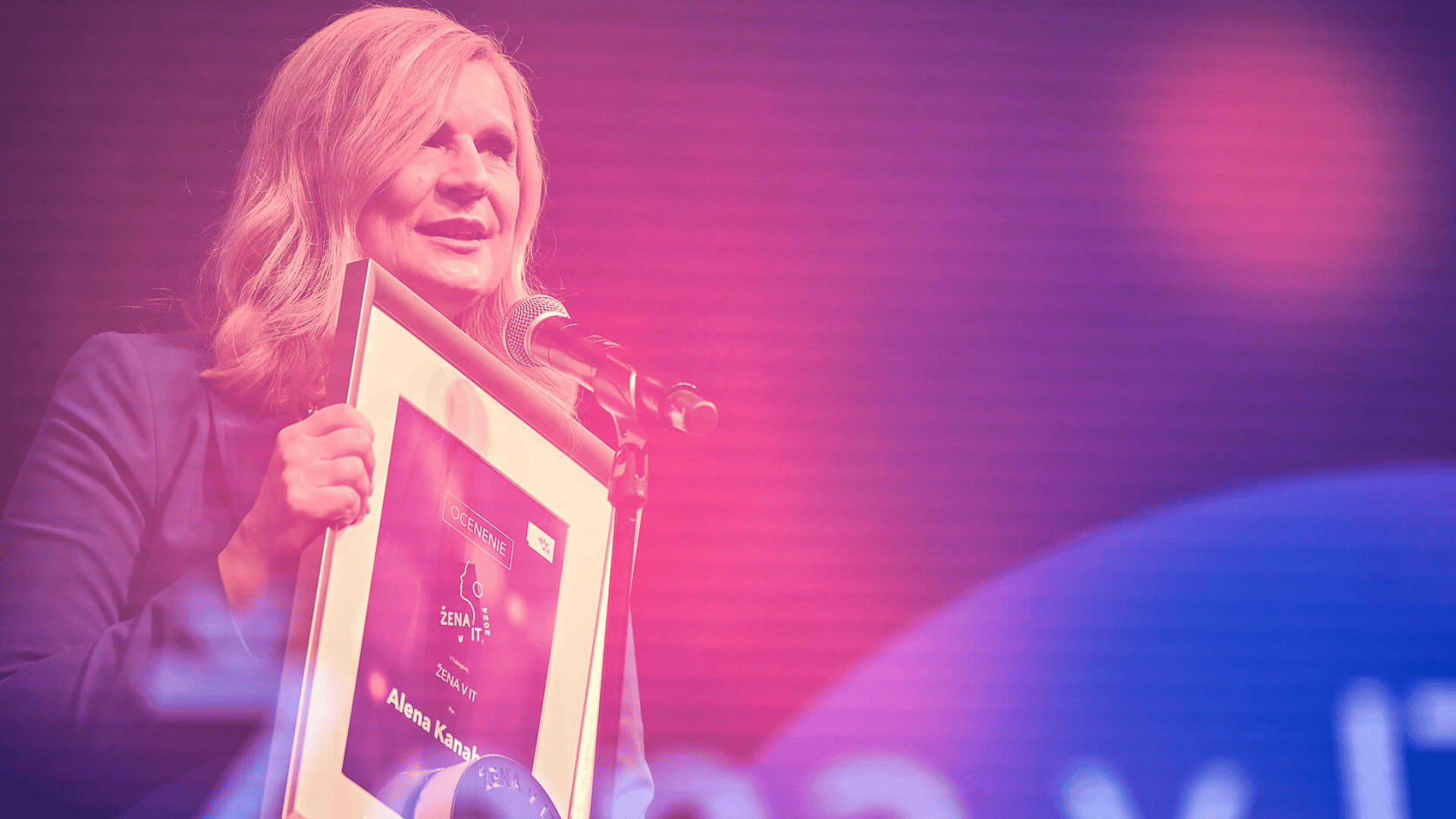Last year, she became the first laureate of the Woman in IT award, presented by the Aj Ty v IT initiative.
What are you currently working on?
I have a dual role. On one hand, within our regional technology centre (covering Slovakia, Czech Republic, Hungary, Romania, and Bulgaria), I’m responsible for projects we deliver to clients in the public and healthcare sectors. On the other hand, I lead our corporate citizenship council, which means I oversee community-focused activities—from donations and volunteering to all our pro bono projects for nonprofit partners. Just recently, we completed a Salesforce-based CRM implementation for the organization VAGUS.
 What achievement in your career are you most proud of?
What achievement in your career are you most proud of?
Definitely the Woman in IT award. For me, it’s not just a professional recognition, but also a validation of the years I’ve dedicated to developing digital skills in our education system and supporting girls and women in IT. It feels amazing to see that my efforts are making a tangible impact. And having someone notice and appreciate that—it’s incredibly rewarding.
A close second would be our company winning the IT Project of the Year in 2023 for an app we developed for the organization Cesta von, which is essential for running their remarkable Omama program. This award is like the Slovak IT Oscars, and I love that we won it for a non-commercial project with a strong social impact.
What motivated you to stay at Accenture for over two decades?
At Accenture, my work has always been project-based, and every project is different. Working with various clients and across different areas makes it feel like you’re constantly starting anew, almost like joining a new company each time. I also enjoy that each project has a clear endpoint—you finish something and move on. And throughout, you’re always learning something new.
Early in my career, I had the unique opportunity to be part of large transformation projects for Slovak clients, bringing major changes to companies at the turn of the millennium. That was exciting. And it still is! Now, with the rapid rise of AI, I’m curious again—where will it take us?
What have you learned from projects that didn’t go as planned?
I’ve learned to be more assertive about my own preferences and to stop trying to please others just to avoid negative emotions or a sense of failure.
I come from a generation that was raised to work hard, and it took me years to realize that my own well-being is just as important. Sometimes you have to remind yourself that no matter how complicated things seem, it’s still just work. In our field, lives typically aren’t at stake—there’s almost always a solution. A colleague of mine has a great saying: “The worst thing is dying from panic.”
Do you still get nervous before starting a new project?
Absolutely! Like many women, I still struggle with impostor syndrome—that inner voice saying, “Am I really the right person for this? Can I handle it?” But it’s about being well-prepared and also reminding myself: What’s the worst that could happen? And seriously—if not me, then who? We women need to build up our confidence.
What specific initiatives have you introduced to support women in IT?
I helped launch upskilling IT courses for women, which we at Accenture either initiated or supported in partnership with Aj Ty v IT and IT v kurze. We even organized several editions of these intensive courses ourselves. Many graduates went on to work with us, while others successfully started IT careers elsewhere.
Another focus of mine is on younger girls in primary and secondary schools. One of my favorite events is the annual Scratchathon organized by Aj Ty v IT (now held in both Bratislava and Košice). It’s aimed at showing pre-teen girls that coding is fun and creative. I never miss a chance to also talk to their parents about why it’s important to support their daughters’ interest in IT.
What results have you achieved?
Over the past 20 years at Accenture Slovakia, we’ve made significant improvements for women—things like part-time work, flexible hours, or working from home, which were unheard of back then. We started these changes to meet the needs of colleagues returning from maternity leave—myself included.
We didn’t stop there. Today we have a comprehensive support package for women, aimed at improving gender balance in our company.

How do you view the current state of diversity and inclusion in Slovakia’s IT sector?
According to Eurostat (2023), women make up 17.4% of the Slovak IT workforce. That’s an improvement (ten years ago, it was just 9.1%), but it’s still far from ideal. I’ve spent years raising awareness about why having more women in IT is important. And no, it’s not just a trendy topic—it has real business benefits.
Without women—or any kind of diversity—teams lack a variety of perspectives, which leads to less creative and innovative solutions. Diverse teams are proven to be more effective, competitive, and better equipped to respond to challenges and opportunities.
Plus, women make up half the population. Their underrepresentation in IT means a massive loss of potential talent—especially when demand for IT professionals already far exceeds supply.
Is there a question you wish people asked you more often—or less often?
It doesn’t bother me too much, but I’m surprised how rarely people ask about more personal things. I think that’s part of everyone’s story and often helps explain why someone is passionate about a certain topic.
I’d love it if people stopped asking questions like: “Why do you want more women in IT (or more balance in other industries)?” If they stopped asking that, it would mean society gets that we all benefit from equal opportunities. And please, no more: “Why are you forcing women into IT if they don’t want to be there?” No one’s forcing anyone!
When Sheryl Sandberg became a widow, she said single parenthood changed her perspective. Has your experience changed your outlook, too?
Sheryl and her speech about losing her husband were a huge inspiration to me after I became a widow two years ago. It hasn’t been easy—and still isn’t. It takes time. Sometimes I feel real anger, like, “Seriously, do I have to handle this too, all on my own?”
It was especially hard during milestones—when my daughter turned 18, during her graduation… Sad moments, realizing what my kids are missing by not having their dad there. But then I think of all the single moms out there—divorced, never married, struggling—and how they get through it. I have immense respect for all single parents, including men. It’s definitely changed my perspective.
What’s your favourite place in Slovakia and why?
Oh, I’m a huge local patriot—I grew up in Liptov, in a village called Závažná Poruba, and went to school in Liptovský Mikuláš. So, without a doubt—my beloved Liptov. Every time I pass Ružomberok and get on the highway there, I get emotional. But I’ve lived more than half my life in Bratislava, and I love this city too—it’s a great place to live.
What advice would you give young women considering a career in IT?
Go for it! Give it a try! I understand that we women often create artificial barriers for ourselves—we doubt whether we’re ready or capable or experienced enough (hello again, impostor syndrome).
What really helped me was changing my mindset. Whenever I hesitate, I ask myself: “What’s the worst that could happen?” And usually, there’s really nothing to be afraid of.
The same goes for women thinking about a career in IT. And if they don’t find support in their immediate surroundings, they can look elsewhere—like in communities around organizations such as Aj Ty v IT, or through individual mentoring.





